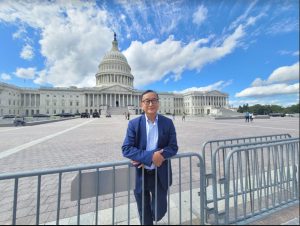Earlier this week, the U.S. House of Representatives passed the Cambodia Democracy Act, which recommends the imposition of sanctions on senior Cambodian officials responsible for undermining the country’s democracy.
The Cambodia Democracy Act of 2021, which was proposed by Steve Chabot (R-OH) and Lowenthal (D-CA), is intended “to promote free and fair elections, political freedoms, and human rights” in the nation, after five years that have seen a ruthless consolidation of power by the ruling Cambodian People’s Party (CPP).
Over the past five years, the CPP administration has banned the country’s main opposition party, the Cambodia National Rescue Party (CNRP), exiled one of its leaders, and arrested another on charges of treason. It has also cowed Cambodian civil society and neutered the independent press, arresting dozens of human rights defenders, low-level CNRP officials, and ordinary citizens for expressing critical views about the government.
This crackdown left the CPP free to run virtually unopposed at the 2018 election, in which it handily won all 125 seats in the National Assembly, extending Prime Minister Hun Sen’s rule deep into its fourth decade.
In response, the bill requires the government to identify officials of the government, military, or security forces who President Joe Biden determines “has directly and substantially undermined democracy in Cambodia” or “committed or directed serious human rights violations associated with undermining democracy in Cambodia.”
These officials will then be subject to sanctions, including asset freezes and travel bans, which will remain in place until “meaningful progress” toward “ending government efforts to undermine democracy” and “ending human rights violations associated with undermining democracy.”
Congress has a long history of activism on Cambodian human rights issues, very often led by representatives of states with large Cambodian-American constituencies, and has established close relations with members of the Cambodian opposition. This has often limited the attempts of the executive branch to build or sustain constructive relationships with Phnom Penh.
This was particularly the case during the period immediately after the 9/11 terror attacks, when engagement with Hun Sen’s government was seen as necessary in order to advance security and counterterrorism goals. But Cambodia’s increasingly close relationship with China has recently made it a subject of broad concern, bringing the executive and legislative branches into closer alignment.
Since the 2018 election, the U.S. government has imposed sanctions on close allies of Hun Sen and his family, and the similarly named Cambodia Democracy and Human Rights Act, which calls for more sanctions on senior Cambodian officials, has also been tabled in the U.S. Senate.
The Cambodian government has responded with efforts to bolster its image in the United States. The passage of the bill by the House came just days after the Cambodian government signed a contract with the Washingt0n, D.C.-based firm Qorvis Communications to “provide strategic communications and media relations services in support of increasing public awareness along with travel and tourism for the Kingdom of Cambodia.” This follows the signing of contracts with other lobbyists in 2019.
Even if it passes the Senate and gains President Biden’s signature, however, more sanctions are unlikely to achieve much except to further sour relations between Washington and Phnom Penh. In a recorded speech to the 76th Session of the United Nations General Assembly held virtually on September 25, Hun Sen cited the recent U.S. debacle in Afghanistan in order to condemn foreign “interference” in other nations’ affairs.
“History has told us time and again that [foreign] interference and – even worse – military options used to impose different systems of governance are not solutions,” he said. “Far from it, they have only led to many more deaths, human suffering and misery, and socio-economic strife.”
He added, “If the recent events in Afghanistan, and many more before that, are lessons to be learned from, then we must learn that there is great merit to respecting the wishes of each nation and their people’s rights to self-determination.”
Of course, Cambodia’s people have been largely deprived of this right to self-determination through the evisceration of any and all sources of effective opposition to the CPP, which gives Hun Sen’s remarks a decidedly hollow ring.
But the Cambodian leader’s remarks hint at the interconnected nature of the U.S-China-Cambodia relationship. Which is to say, the Cambodian government’s intimate relationship with Beijing cannot be understood in isolation from the three-decades of concerted efforts by Western governments, particularly Washington, to promote democratic norms in Cambodia, a project that the CPP administration has viewed, incorrectly but not unsurprisingly given the history of U.S. policy toward Cambodia, as a moral flag of convenience for its own removal from power.
While the Cambodian government is showing signs of a desire to repair relations with the U.S., it draws a red line at anything seen to empower opponents that it has long viewed as enemies. Far from having its intended effect, fresh sanctions will most likely simply entrench the Cambodian government’s determination to free itself from outside “interference” by any means necessary.

































